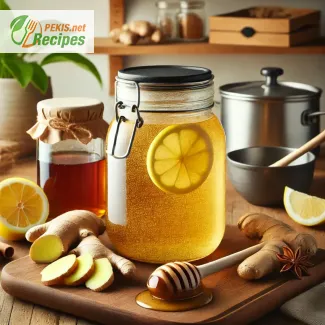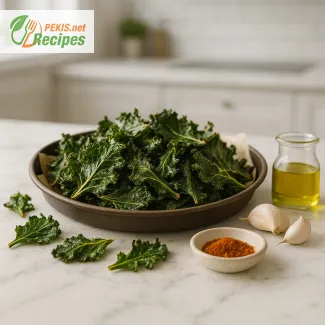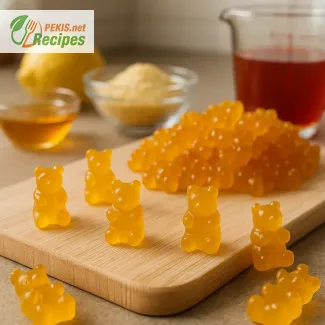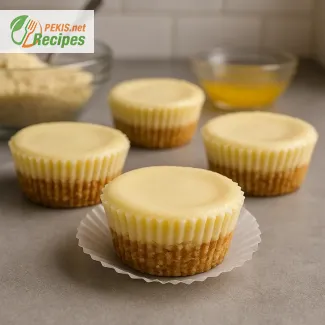
Homemade Ginger and Honey Syrup for Cough Relief is a timeless remedy that has been cherished across cultures for its soothing and natural healing properties. Combining the fiery warmth of ginger, the sweet, golden richness of honey, and a hint of fresh lemon juice, this syrup not only eases discomfort but also provides a delicious, all-natural way to support your immune system. Perfect for chilly days or when you're feeling under the weather, this syrup is a must-have in every home.
The key ingredient, ginger, has been celebrated for centuries in traditional medicine for its potent anti-inflammatory and antimicrobial properties. It works wonders in alleviating throat irritation and breaking down mucus, making it easier to breathe and swallow. The honey, on the other hand, offers a natural sweetness while serving as an effective cough suppressant. Its antimicrobial qualities help fight infections, while its soothing texture coats the throat, providing instant relief. Finally, the addition of fresh lemon juice adds a zesty freshness, loaded with vitamin C to give your immune system a much-needed boost during colder months or flu season.
What sets this syrup apart is not just its effectiveness but also its simplicity. Unlike over-the-counter remedies that often contain artificial additives and preservatives, this homemade version is completely natural, ensuring that you're only consuming ingredients that are good for your body. Whether you’re preparing it for yourself, your children, or elderly family members, this syrup is a safe, gentle, and effective alternative to chemical-laden cough syrups.
The versatility of this syrup is another reason it’s a kitchen staple. Beyond being a remedy, it can also be used as a comforting beverage by simply stirring a spoonful into warm water or tea. This transforms it into a delightful drink that not only soothes but also hydrates and nourishes. For those who enjoy experimenting, the syrup can even be drizzled over pancakes, waffles, or oatmeal for a delicious twist with health benefits.
Preparing this homemade ginger and honey syrup is both quick and rewarding. It takes only a handful of ingredients and a little bit of time, making it an ideal remedy for busy lifestyles. The process involves gently simmering freshly grated ginger to extract its essential oils and beneficial compounds, combining it with pure honey, and balancing the flavors with the brightness of lemon juice. The result is a rich, golden syrup that’s as pleasing to the palate as it is effective in soothing a sore throat and calming a persistent cough.
Health-conscious individuals will appreciate that this syrup is not only effective but also packed with nutrients. It contains antioxidants from ginger and honey, which help combat free radicals, reducing oxidative stress in the body. The lemon juice adds a punch of vitamin C, crucial for maintaining a robust immune response. These ingredients work synergistically, enhancing each other’s benefits to deliver a holistic remedy that addresses the root causes of discomfort while boosting overall well-being.
In terms of storage, this syrup is wonderfully practical. It can be kept in the refrigerator for up to two weeks, ensuring you have a readily available solution whenever symptoms arise. A small jar of this syrup can also make a thoughtful and heartfelt gift for friends or family members during the colder months, showing care and love in a way that store-bought products simply can’t match.
For parents looking for a gentle, child-friendly remedy, this syrup is a great choice. Its naturally sweet flavor appeals to kids, making it easier to administer than bitter or unpleasant-tasting medicines. However, it’s important to note that honey should not be given to children under one year of age due to the risk of botulism.
This ginger and honey syrup is more than just a remedy; it’s a testament to the power of simple, natural ingredients to nourish, heal, and comfort. Whether you’re looking for relief from a scratchy throat, a remedy to ease nighttime coughing, or a preventative boost to your immune system, this homemade syrup delivers on all fronts. With its delightful taste, rich texture, and myriad health benefits, it’s no wonder this recipe has stood the test of time as a trusted ally against colds and coughs.
- Prepare the ginger:
Peel and grate 50 g of fresh ginger using a fine grater. This ensures maximum extraction of ginger’s beneficial compounds. - Simmer the ginger:
In a medium saucepan, combine the grated ginger and 250 ml (1 cup) of water. Bring to a boil over medium heat, then reduce to a simmer. Let it simmer gently for 15 minutes, allowing the ginger to infuse the water. - Strain the ginger water:
After simmering, strain the liquid through a fine mesh sieve or cheesecloth into a clean bowl to remove the ginger solids. Discard the solids. - Combine the ingredients:
Return the strained ginger water to the saucepan. Add 200 ml (¾ cup) of honey and stir until fully dissolved. Ensure the mixture does not boil to preserve the honey's natural properties. - Add lemon juice:
Remove the saucepan from heat and stir in 50 ml (¼ cup) of fresh lemon juice. Mix thoroughly. - Cool and store:
Allow the syrup to cool completely. Pour into a sterilized glass jar or bottle with a tight-fitting lid. Store in the refrigerator for up to 2 weeks. - Usage:
Take 1-2 teaspoons (10 ml) as needed for cough relief. Alternatively, mix with warm water or tea for a soothing drink.
Tips and Adjustments for Perfecting Homemade Ginger and Honey Syrup
When preparing Homemade Ginger and Honey Syrup for Cough Relief, the beauty of this recipe lies in its versatility. Each ingredient plays a vital role, but subtle adjustments can elevate the flavor, enhance its effectiveness, or tailor it to individual preferences. Below are professional insights into how ingredient substitutions or modifications impact the taste, health benefits, and overall appeal of this recipe.
Choosing the Right Ginger
Fresh Ginger vs. Dried Ginger
- Fresh Ginger: The recipe calls for fresh, grated ginger, which provides a sharp, zesty flavor with a subtle sweetness. Fresh ginger contains more gingerol, the active compound that delivers anti-inflammatory and antioxidant properties.
- Dried Ginger: If fresh ginger is unavailable, use dried ginger powder. Replace 50 g of fresh ginger with 1 tablespoon (5 g) of dried ginger. This substitution results in a milder, warmer flavor but retains the health benefits. Be mindful that dried ginger is more concentrated, so adjust the quantity carefully to avoid overpowering the syrup.
Increasing or Reducing Ginger
- For a spicier kick, increase the ginger to 60-70 g. This will amplify the warming sensation and make the syrup more effective for clearing congestion.
- If serving children or those sensitive to strong flavors, reduce ginger to 30 g for a milder, more approachable taste.
Enhancing Sweetness with Honey
Selecting the Right Honey
- Floral Honey: Varieties like clover, acacia, or orange blossom honey add a delicate floral note to the syrup.
- Raw or Dark Honey: Using raw or darker honey, such as buckwheat honey, imparts a deeper, more robust flavor. These types also contain higher levels of antioxidants, making the syrup even more beneficial for health.
- Honey Alternatives: For a vegan or allergy-friendly option, substitute honey with maple syrup or agave nectar in the same quantity (200 ml). This will result in a slightly thinner syrup with a caramelized undertone.
Adjusting the Citrus Profile
Lemon Variations
- The recipe uses fresh lemon juice for its tangy brightness and vitamin C content. To adjust the flavor:
- Increase Lemon Juice: For a sharper, tangier syrup, increase the lemon juice to 60-70 ml. This is especially refreshing if the syrup is used in warm water or tea.
- Reduce Lemon Juice: To tone down the citrus tang, reduce the lemon juice to 30 ml. This creates a smoother, sweeter syrup suitable for children or those with sensitive palates.
Lime as a Substitute
- Replace lemon juice with an equal quantity of lime juice for a more tropical flavor. Lime has a zestier, slightly sweeter profile that complements the ginger and honey beautifully.
Adding Depth with Herbs and Spices
Optional Enhancements
- Mint Leaves: Add a handful of fresh mint leaves while simmering the ginger to create a cooling aftertaste. This is particularly soothing for irritated throats.
- Turmeric: Include ½ teaspoon (2.5 g) of ground turmeric to enhance the syrup’s anti-inflammatory properties. Turmeric also adds a warm, earthy note and a golden hue to the syrup.
- Pepper: A pinch of ground black pepper can intensify the warming effect and help improve the absorption of gingerol and curcumin (if turmeric is added).
Adjusting Consistency
Thicker Syrup
- To create a thicker, more concentrated syrup, reduce the water to 200 ml during simmering. This yields a denser consistency ideal for drizzling over food or for longer-lasting relief in smaller doses.
- If the syrup is too thick after cooling, stir in a tablespoon of warm water to reach the desired texture.
Thinner Syrup
- If you prefer a lighter syrup that mixes easily into drinks, increase the water to 300 ml. This makes the syrup less concentrated but easier to use as a beverage base.
Storage and Shelf Life
Preserving Freshness
- Add ½ teaspoon (2.5 ml) of apple cider vinegar during the final mixing stage to extend the syrup’s shelf life. The vinegar adds a subtle tang and natural preservation without overpowering the taste.
Freezing for Convenience
- Pour the syrup into ice cube trays and freeze. These individual portions can be thawed as needed and used directly in hot water or tea.
Balancing Flavors
Sweetness vs. Spiciness
- If the syrup is too spicy, counterbalance it by adding an extra tablespoon (15 ml) of honey.
- If the syrup is too sweet, add an additional tablespoon (15 ml) of lemon juice or a pinch of salt to mellow the sweetness.
Customizing for Different Uses
As a Drink Base
- For a refreshing summer beverage, mix the syrup with cold sparkling water and garnish with a lemon slice and fresh mint.
- For a warm winter drink, add a spoonful of syrup to herbal tea or hot water. Consider adding a cinnamon stick for a festive touch (if not restricted).
For Desserts and Breakfasts
- Drizzle the syrup over pancakes, waffles, or oatmeal for a nutritious and flavorful topping.
- Mix the syrup into plain yogurt or smoothies for a unique twist.
Health-Focused Adjustments
For Low-Sugar Variations
- Replace half the honey with stevia or monk fruit sweetener for a reduced-sugar alternative. This lowers the calorie content while maintaining sweetness.
- Dilute the syrup with an additional 50 ml of water for a less concentrated version that’s still effective but lighter on sugar.
Enhancing Nutrient Density
- Add a teaspoon of chia seeds to the syrup before serving for added fiber, omega-3 fatty acids, and a slight crunch.
This versatile recipe is a wonderful base for experimentation. Adjusting the ingredients and ratios allows you to create a syrup that aligns with your personal taste preferences and health goals. Whether you prefer it spicy, sweet, citrusy, or with an added herbal twist, this ginger and honey syrup can be easily tailored to suit every need, making it an essential staple in any kitchen.
- Contains: Honey (not suitable for infants under 1 year).
- Free from: Gluten, dairy, nuts, and eggs.
- Substitution for allergies: Replace honey with maple syrup for a vegan alternative or if allergic to honey.
- Vitamin C: 10 mg per serving – Boosts immune function and helps repair tissues.
- Potassium: 15 mg per serving – Supports heart health and muscle function.
- Magnesium: 2 mg per serving – Contributes to nerve and muscle function.
- Gingerol (from ginger): Anti-inflammatory properties; supports respiratory health and reduces throat irritation.
- Flavonoids (from honey): Protect cells from damage caused by free radicals, enhancing overall immune defense.
- Ascorbic acid (from lemon juice): Potent antioxidant that strengthens the body’s natural defenses.
Enjoy this natural, homemade syrup as a comforting remedy to soothe your throat and calm your cough!





